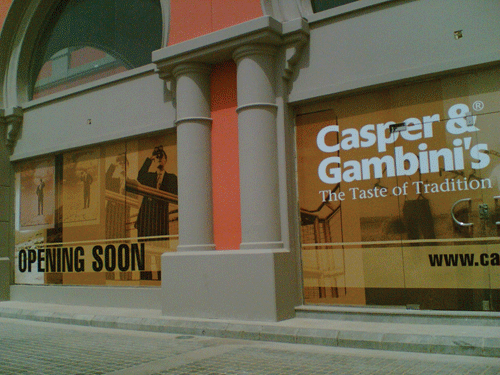The Lebanese are hardly known for living in harmony. They are more often at each other’s throats — if politics is anything to go by — than working collectively for a mutually beneficial future. But where political and civic cooperation leaves much to be desired, the Lebanese entrepreneurial spirit is alive and kicking.
Over the past decade a flurry of Lebanese brands started up and the more successful, primarily from the food and beverage (FNB) sector, expanded abroad as franchises into the burgeoning Gulf markets. Following the Syrian withdrawal from Lebanon in 2005 and the opening up of the economy, Lebanese businesses have also opened up shop in Damascus, while Amman has become a solid revenue earner.
What is perhaps surprising is that, given such regional success, it took until late 2006 for a franchises association to be established to bring together Lebanese brands, learn from each other’s experiences and push forward the expansion of Lebanese franchises.
Just over two years on, the Lebanese Franchises Association (LFA) is demonstrating what the country’s politicians have been unable to do: work together to improve business. For while the first half of the LFA’s slogan might need to be taken with a pinch of salt, the second half has proven to be correct: “Great nations make great brands.”
“I think what’s good about it is that Lebanon is always very good individually but bad collectively, so I salute this effort of Lebanese working together towards a common goal,” said Dani Richa, chief creative officer of advertising firm Impact BBDO and a strategic partner of the LFA. “The LFA is definitely a positive — a sharing of knowledge, know-how and best practice.”
The Middle East, the Med & the World
The LFA has certainly been active, with 55 members signing up, from ABC Mall, Patchi and Crepaway, to Najjar Gourmet, Pain d’Or, Salmontini and Al Rifai. Companies gain from training and guidance, with a franchising school established at the École Supérieure d’Administration in Beirut, offering legal advice on franchising and international exposure.
“The motivation was to give members know-how about franchising, then work on intellectual property rights, which is important in Lebanon to protect know-how and the brand name,” said Charles Arbid, president of the LFA and CEO of men’s clothes wear company Rectangle Jaune. “We then want to become a lobby group to work and interact with the government regarding trade and the industry itself.”
With a vigorous membership criteria, Yahya Kassa’a, general executive of Kassa’a Paints Group and member of the LFA, said the association has been elitist.
“It’s been the nice ideas of Lebanon: Patchi, Rectangle Jaune and concepts like Casper and Gambini. But we are going to introduce people from abroad, with Dunkin’ Donuts joining lately, and trying to keep Lebanese flair while getting bigger,” he said.
Richa said the LFA was too heavily skewed towards the food and beverage sector, and needs to diversify.
“I’d really like to see it go beyond the food and beverage lead,” he said.
But Arbid says that’s part of the nature of the franchise.
“We are trying to cover all the sectors, but restaurants offer the biggest potential for franchising,” he said.
Whether the LFA is elitist or not, it does have to be less discriminate after gaining membership in the World Franchise Council (WFC), made up of 34 franchise associations globally. One condition of the WFC is that the LFA be opened to non-Lebanese franchises. This will drastically boost the number of LFA players. “We believe we can reach over 100 members soon, especially as we opened the door to franchises,” said Arbid.
The membership of the WFC clearly works both ways, allowing for Lebanese franchises to enter markets elsewhere, even while foreign franchises in Lebanon gain from LFA experience. Seeing this potential, the LFA helped create the Mediterranean Franchise Association with 14 other countries in April. It is an indication of the strategic markets Lebanese brands want to expand into following entry in the Gulf and Levant markets.
“The new markets are the south Mediterranean: Morocco, Tunisia, Algeria and Libya, as it’s maybe too early to go to Europe,” Arbid said. “It’s best to go not to virgin markets but emerging markets.”
While the LFA is actively working on such expansion, individual members are eying franchise prospects even further afield. Kassa’a has expanded eastwards beyond the Gulf to have a branch in Kabul, and is to enter the French market with niche decorative products.
“We’re not far from signing in France, so bucking the trend [of the global downturn]. People are shocked,” Kassa’a said.
Restaurant chain Casper and Gambini had a chance to open in Malaysia at a mall half owned by the Kuwait Financial House that would target the Arab tourism segment.
“We had an opportunity but we didn’t find a local partner,” said Anthony Maalouf, chief executive officer of Casper and Gambini.
Solid partnership
The need for partnerships, typically for 10 years, is one area that the LFA assists in, yet the decision is ultimately up to the franchiser. And getting the right partner is not always straightforward said Maalouf, adding that formal agreements in the Middle East are “only ink on paper.” In Dubai, the local franchisee shifted interest away from involvement with Casper and Gambini after two years.
“We missed the train, but what’s going on there now can get us into the market,” Maalouf said.
Yet Casper and Gambini is a strong brand, and the company is finding offers from local players, such as in Syria.
“Since the region opened as one market, and we have brand value, we don’t need locals to get land or the location,” Maalouf said. “Real estate developers come to us and we can go directly in or as partners.”
Given the current status of the financial markets, expanding abroad in the present climate would seem low on most business’s priority lists. But Lebanese brands have continued to enjoy growth throughout the Middle East, buoyed by strong growth in the local market.
“Last year was a very good year for everyone, and in 2009 [there is] still growth in the first quarter,” Arbid said.
Such results have only boosted brands appetite for expansion. For instance, Casper and Gambini opened three new outlets in Lebanon over the past year, revenues have tripled, and the brand is set to open in the soon to be opened Souks of Beirut. Abroad, outlets are to open in Kuwait and Qatar, while Casper and Gambini has expanded into a falafel franchise, Falafel Nadia, in Kuwait.
But for Lebanese brands to truly succeed internationally, they need to do well at home.
“In no way can the LFA do well abroad if it does not do well locally. There is a direct correlation,” Arbid said. “We need to wait and see what direction the global economy is going in, and in Lebanon over the next six months whether it remains politically stable.”









